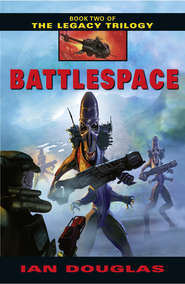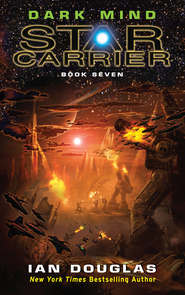По всем вопросам обращайтесь на: info@litportal.ru
(©) 2003-2024.
✖
The Complete Legacy Trilogy: Star Corps, Battlespace, Star Marines
Настройки чтения
Размер шрифта
Высота строк
Поля
“Eh? With the Marines? What can they teach you? How to kill people? How to shed whatever civilized instincts you may have acquired and become an animal, a sociopathic murderer? Is that what you want?”
The house butler rolled in. “Excuse me,” it said. “There is—”
“Get out!” the elder Esteban screamed.
“Yes, sir.” Obediently, the robot spun about and glided out of the room once more, as though it was used to Carlos’s violent moods.
“You just want to go with those worthless gringo friends of yours,” his father continued. “You think military service is some sort of glamorous game, eh?”
“Have you thought about joining the Navy, Johnny?” his mother asked helpfully, with a worried, sidelong glance at his father. “Or the Aerospace Force? I mean, if you want to travel, to go offworld—”
“All of the services are parasites!” Carlos shouted, turning on her. “And the Marines are the worst! Invaders, oppressors, with their boots on our throats!”
“My grandfather was a Marine,” John said with more patience than he felt. “As was his father. And his mother and father. And—”
“All your mother’s side of the family,” his father snapped. He drained the last of his whiskey, then moved to the bar to pour himself another. He appeared to be calming down. His voice was quieter, his movements smoother. A dangerous sign. “Not mine. Always, it is the damned Garroways—”
“Carlos!” his mother said. “That’s not fair!”
“No? Please excuse me, Princessa del Norte! The gringos are always in the right, of course!”
“Carlos—”
“Shut up, puta! This worthless excuse for a son is your fault!”
The house had been signaling for several moments, first with an audible tone, then with a soft voice transmitted through John’s cerebral implants. No doubt the butler had been dispatched with the same warning: someone was still at the front door. A quick check with the house security camera showed him Lynnley Collins’s face.
Now might be his only chance.
“I’ll, um, see who’s at the door,” he said, and slipped as unobtrusively as possible from the room. His father was still screaming at his mother as he rode the curving line of moving steps from the E-center to the entranceway, alerting the house as he descended to open the door.
Lynnley was standing on the front deck, looking particularly fetching in a yellow sunsuit that bared her breasts to the bright, golden warmth of the Sonoran sun. Her dark-tanned skin glistened under her body’s UV-block secretions. Her eyes, with her sunscreen implants fully triggered, appeared large and jet-black.
“Uh, hi,” he said, slipping easily into English. Lynnley was the daughter of a norteamericano family stationed at the naval base up at Tiburón. She spoke excellent Spanish, but he preferred using English when he was with her.
She glanced past him as he stepped outside, brushing back a stray wisp of dark blond hair. The door hissed shut, cutting off his father’s muffled shouts.
“Whoo,” she said. “Bad one?”
He shrugged. “Pretty much what I expected, I guess.”
“That bad?” She touched his arm in sympathy. “So what are you going to do?”
“What can I do? I already thumbed the papers. We’re Marines now, Lynn.”
She laughed. “Well, not quite. There are a few minor formalities to attend to first. Like basic training, remember?”
He walked to the side of the deck, leaning against the redwood railing and staring out over the glistening waters of the Gulf of California. La Hacienda Esteban clung to the summit of a high hill overlooking the cape. The sprawl of the town of Guaymas, the harbor crammed with fishing boats, the clutter of resorts along the coast, provided a bright, tropical splash of mingled colors between the silver-gray sea and the sere brown of the hills and cliff sides. God, I hate it here, he thought.
“Having second thoughts?” Lynnley asked.
“Huh? Hell no! I’ve got to get out of here!”
“There are other ways to leave home than joining the Marines.”
“Sure. But I’ve always wanted to be a Marine. Ever since I was a kid. You know that.”
“I know. It’s the same with me. It’s in the blood, I guess.” She moved to the railing beside him, leaning against it and looking down at the town. “Is it just the Marines your dad hates? Or all gringos?”
“He married a gringo, remember. And she was a Marine’s daughter.”
“Hell, the war was over twenty years before he was born, right? What’s his problem?”
John sighed. “Some of the families down here have long memories, you know? His grandfather was killed at Ensenada. He doesn’t like the government, and he doesn’t like the military.”
“What is he, Aztlanista?”
“I don’t know anymore. Some of his drinking buddies are, I’m pretty sure. And I know he subscribes to a couple of different Aztlan nationalist netnews sites. He likes their ideas, whether he’s a card-carrying member or not.”
“S’funny,” Lynnley said. “Most of the Aztlanistas are poor working class. Indios, farmers. You don’t usually see the big landowners messing with the status quo, joining revolutionary organizations and all that.” She tossed her head, indicating the hacienda and the surrounding hilltop lands. “And your family does have money.”
He shrugged. “I guess. We don’t talk about where the money came from, of course.” His father’s family had become fabulously wealthy in the years before the UN War, when parts of Sonora and Sinaloa—then states of the old Mexican Republic—had furnished a large percentage of several types of illicit drugs for the huge and wealthy northern market.
“But it’s not just the money,” he went on. “There’s still such a thing as national pride. And all of the big-money families around here stand to come out on top of the heap if Aztlan becomes a reality. The new ruling class.”
“Huh. You think that could happen?”
“No,” he replied bluntly. “Not a snowball’s chance on Venus. But the possibility is going to keep the locals stirred up for a long time.”
Baja, Sonora, Sinaloa, and Chihuahua were the newest dependent territories of the burgeoning United Federal Republic, a political union that included the fifty-eight states of the United States plus such far-flung holdings as Cuba, the Northwest Territory, and the UFR Pacific Trust. Acquired during the Second Mexican War of ’76–’77, all four north Mejican territories were in line to be granted statehood, as the fifty-ninth through the sixty-second states, respectively, pending the outcome of a series of referendum votes scheduled in two years. Heavily dependent both on Yankee tourism and on northern markets for seafood and marijuana products, the region of old Mexico surrounding the Gulf of California had closer ties to the UFR than to the Democratic Republic of Mejico, and statehood was likely to pass.
But many in the newly acquired territories favored independence. The question of Aztlan, a proposed Latino nation to be carved out of the states of northern Mejico and the southwestern United States, had been one of the principal causes of the UN War of almost a century ago. The then–United Nations had proposed a referendum in the region, with a popular vote to determine Aztlanero independence. Washington refused, pointing out that the populations of the four U.S. states involved were predominantly Hispanic and almost certain to vote in favor of the referendum, and that federal authority superceded local desires. The war that followed had raged across the Earth, in orbit, and on the surfaces of both the Moon and Mars.
In the end, with the disintegration of the old UN and the rise of the U.S./UFR-Russian-Japanese–led Confederation of World States, Aztlan independence had been all but forgotten … save by a handful of Hispanic malcontents and disaffected political dreamers scattered from Mazatlan to Los Angeles.
The dream remained alive for many. John’s father, his family long an important clan with connections throughout Sonora and Sinaloa, had been more and more outspoken against the gringo invaders who’d migrated south since the Mexican War. “Carpetbaggers,” he called them, a historical allusion to a much earlier time.
But he’d not been able to convince John, and for the past four years their relationship, already shaky with Carlos’s drinking and his notoriously quick temper, had grown steadily worse.
“Have you ever thought,” Lynnley said quietly, “that you and your dad could end up on opposite sides, if fighting breaks out?”
“Uh-uh. Won’t happen. The government can’t use troops on federal soil.”
“A war starts down here, and all it would take is a presidential order. The Marines would be the first ones to go in.”
“It won’t come to that,” he said, stubborn. “Besides, I want space duty.”
She laughed. “And what makes you think they’ll take what you want into consideration?”











